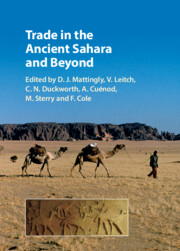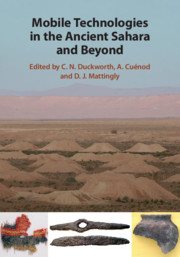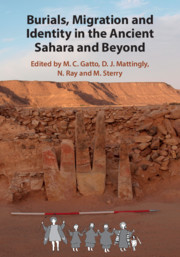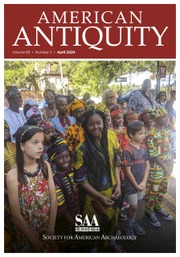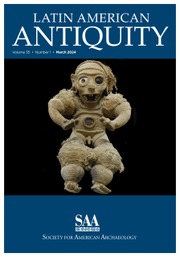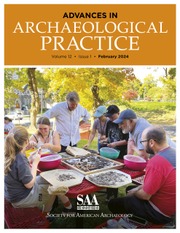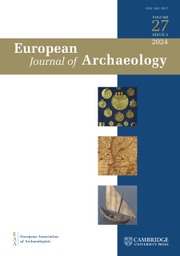Urbanisation and State Formation in the Ancient Sahara and Beyond
$190.00 (C)
Part of Trans-Saharan Archaeology
- Editors:
- Martin Sterry, University of Durham
- David J. Mattingly, University of Leicester
- Date Published: April 2020
- availability: In stock
- format: Hardback
- isbn: 9781108494441
$
190.00
(C)
Hardback
Other available formats:
eBook
Looking for an examination copy?
This title is not currently available for examination. However, if you are interested in the title for your course we can consider offering an examination copy. To register your interest please contact [email protected] providing details of the course you are teaching.
-
The themes of sedentarisation, urbanisation and state formation are fundamental ones in the archaeology of many diverse parts of the world but have been little explored in relation to early societies of the Saharan zone. Moreover, the possibility has rarely been considered that the precocious civilisations bordering this vast desert were interconnected by long-range contacts and knowledge networks. The orthodox opinion of many of the key oasis zones within the Sahara is that they were not created before the early medieval period and the Islamic conquest of Mediterranean North Africa. Major claims of this volume are that the ultimate origins of oasis settlements in many parts of the Sahara were considerably earlier, that by the first millennium AD some of these oasis settlements were of a size and complexity to merit the categorisation 'towns' and that a few exceptional examples were focal centres within proto-states or early state-level societies.
Read more- The state of the field in the study of urbanisation and state formation of the Sahara and neighbouring regions
- Sets the agenda for future research on sedentarisation, oasis formation, urbanisation and state formation
- Collates all published historical era radiocarbon dates from the Sahara, as well as a wide range of data from a vast geographic zone
Customer reviews
Not yet reviewed
Be the first to review
Review was not posted due to profanity
×Product details
- Date Published: April 2020
- format: Hardback
- isbn: 9781108494441
- length: 764 pages
- dimensions: 253 x 180 x 43 mm
- weight: 1.61kg
- contains: 77 b/w illus. 63 colour illus. 10 tables
- availability: In stock
Table of Contents
Part I. Introduction:
1. Introduction to the themes of sedentarisation, urbanisation and state formation in the ancient Sahara and beyond David J. Mattingly and Martin Sterry
Part II. Oasis Origins in the Sahara: A Region-By-Region Survey:
2. Garamantian oasis settlements in Fazzan David J. Mattingly, Stefania Merlo, Lucia Mori and Martin Sterry
3. Pre-Islamic oasis settlements in the eastern Sahara David J. Mattingly, Martin Sterry, Louise Rayne and Muftah Al-Haddad
4. The urbanisation of Egypt's western desert under Roman rule Anna Lucille Boozer
5. Pre-Islamic oasis settlements in the northern Sahara David J. Mattingly, Martin Sterry, Muftah Al-Haddad and Pol Trousset
6. Pre-Islamic oasis settlements in the north-western Sahara Martin Sterry, David J. Mattingly and Youssef Bokbot
7. Pre-Islamic oasis settlements in the southern Sahara Martin Sterry and David J. Mattingly
8. Discussion: sedentarisation and urbanisation in the Sahara Martin Sterry and David J. Mattingly
Part III. Neighbours and Comparanda:
9. Early states and urban forms in the middle Nile David N. Edwards
10. Mediterranean urbanisation in North Africa: Greek, Punic and Roman models Andrew I. Wilson
11. Numidian state formation in the Tunisian High Tell Joan Sanmartí, Nabil Kallala, Maria Carme Belarte, Joan Ramon, Francisco José Cantero, Dani López, Marta Portillo and Sílvia Valenzuela
12. The origins of urbanisation and structured political power in Morocco: indigenous phenomenon or foreign colonisation? Youssef Bokbot
13. Architecture and settlement growth on the southern edge of the Sahara: timing and possible implications for interactions with the north Kevin C. Macdonald
14. Long-distance exchange and urban trajectories in the first millennium AD: case studies from the middle Niger and middle Senegal River valleys Susan Keech Mcintosh
15. First millennia BC/AD fortified settlements at Lake Chad: implications for the origins of urbanisation and state formation in sub-Saharan Africa Carlos Magnavita
16. At the dawn of Sijilmasa: new historical focus on the process of emergence of a Saharan state and a caravan city Chloé Capel
17. The early Islamic trans-Saharan market towns of West Africa Sam Nixon
18. Urbanisation, inequality and political authority in the Sahara Judith Scheele
Part IV. Concluding Discussion:
19. State-formation in the Sahara and beyond David J. Mattingly and Martin Sterry.
Sorry, this resource is locked
Please register or sign in to request access. If you are having problems accessing these resources please email [email protected]
Register Sign in» Proceed
You are now leaving the Cambridge University Press website. Your eBook purchase and download will be completed by our partner www.ebooks.com. Please see the permission section of the www.ebooks.com catalogue page for details of the print & copy limits on our eBooks.
Continue ×Are you sure you want to delete your account?
This cannot be undone.
Thank you for your feedback which will help us improve our service.
If you requested a response, we will make sure to get back to you shortly.
×

